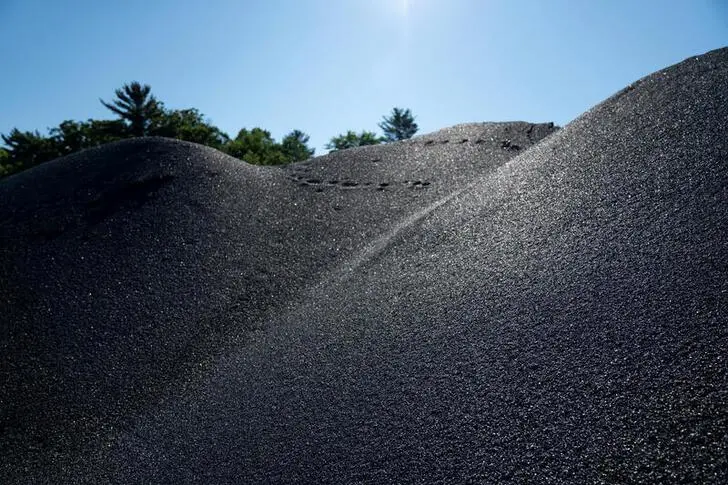PHOTO
LAUNCESTON, Australia - There are signs that the price and demand surge for coal during the recent colder-than-expected winter across North Asia is starting to ease, even as the outlook for the seaborne market for the fuel remains solid.
Asia's total imports of seaborne coal, both thermal for power plants and coking for steel-making, were estimated by Refinitiv at 65.59 million tonnes in February, down from January's 80.71 million tonnes.
The February figure was also 15% below the same month in 2020, while the January number itself was a drop of 5.6% on the previous year, according to vessel-tracking and port data.
China, the world's biggest producer, consumer and importer of coal, saw its seaborne imports drop to 18.14 million tonnes in February, down from January's 22.72 million and also well below the 21.78 million tonnes from February last year.
India's imports were 13.47 million tonnes in February, down from 17.98 in January. That was also significantly below the 18.4 million the world's second-largest importer landed in February 2020.
Japan, Asia's third-ranked importer, brought in 13.80 million tonnes in February - a drop from January's 16.21 million tonnes and also slightly below the 13.89 million tonnes recorded in February last year.
South Korea was the only one of Asia's top four importers to see a year-on-year increase in imports in February, to 7.78 million tonnes, marginally higher than 7.43 million in February last year.
However, its January imports of 8.55 million tonnes were 18% below the 10.44 million recorded in the same month in 2020.
Overall, the pattern seems to be that while imports in the latter months of winter were robust across Asia, demand was actually lower than for the same period a year earlier.
This begs the question as to why seaborne thermal coal prices performed so well in the just-concluded winter, rising substantially above the levels of the previous winter season.
The benchmark Australian thermal coal price, the Newcastle Weekly Index, as assessed by commodity price reporting agency Argus, dropped to $82.16 a tonne in the week ended Feb. 26.
This was down from the prior week's $86.80 a tonne and from the winter peak of $89.69 in the seven days ended Jan. 29.
But the price was 24% higher than the $66.32 that prevailed at the same time last year, and a whopping 77% above the 2020 low of $46.37, hit in September.
Similarly, the price of lower-energy Indonesian thermal coal - popular with both Chinese and Indian buyers - has also held up.
It dropped to $39.40 a tonne in the week to Feb. 26, down from the winter peak of $49.95 a tonne from the week to Jan. 22, but that was still 13% higher than the price that prevailed at this time last year. It's also 74% above the low last year of $22.63 a tonne, also reached in September.
CHINA-AUSTRALIA DISPUTE
While a rally in prices both before and during winter isn't unusual, given seasonal demand patterns, what is harder to explain is why thermal coal prices gained much more in the winter just concluded, especially given that seaborne demand was actually softer.
Supply issues may have played a small part, with some producers cutting back on output as prices weakened during the height of the lockdowns across Asia as part of efforts by governments to contain the spread of the novel coronavirus.
But it's likely that a bigger factor was government policies, especially China's effective ban on imports from Australia, the world's top exporter of coking coal and number two behind Indonesia in thermal cargoes.
The unofficial ban is part of Beijing's campaign against Canberra over a variety of issues, ranging from investment to the early response to the coronavirus outbreak.
China's imports from Australia plummeted from September, dropping close to zero from November onwards, with only a handful of vessels being allowed to discharge. For example, six cargoes totalling just 310,000 tonnes were offloaded in February, a fraction of the 2020 peak of 9.49 million tonnes in January.
At the same time, China's imports from Indonesia soared, with the 15.85 million tonnes imported in January being the most since Refinitiv started assessments in 2015, and February's 12.6 million being the third-highest.
The Chinese action forced traders across Asia to adjust buying patters, as Chinese traders bid up the price for Indonesian cargoes and buyers in India were left with little option but to buy from Australia.
It's likely that the readjustment of trade flows will continue this year, as the China-Australia dispute shows little sign of resolution.
However, thermal coal prices are also likely to adjust. And while seaborne demand overall may recover slightly as economies rebound, the premium caused by China's actions will be harder to sustain.
Clyde Russell
(Editing by Kenneth Maxwell) ((clyde.russell@thomsonreuters.com)(+61 437 622 448)(Reuters Messaging: clyde.russell.thomsonreuters.com@reuters.net))





















